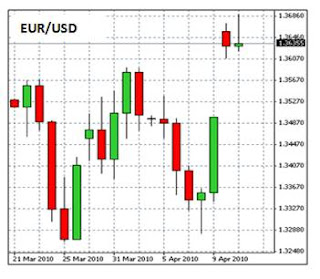Forex:Deals affirmed but are conditional as based on market consolidation
Friday, April 30, 2010
The euro rose on Thursday, rebounding from a one-year low the previous day on hopes a bail-out plan for debt-stricken Greece would be finalized soon. Gains were limited, however, as details of the Greece package were thin, leaving uncertainties about the timing and implementation of any deal.
Germany's largest opposition party said it would move quickly to approve German participation, while European Union Economic and Monetary Affairs Commissioner Olli Rehn said the European Union should complete talks "within days”. However, Rehn said he still could not provide details of the deal, which he said were "conditional on fiscal consolidation."
Mr. Rehns speech he emphasis on “a multi annual program” has helped provide comfort to markets amid fears that the initial plan for a 45 billion euro package would only help meet Greece's borrowing needs through the current year. IMF officials have reportedly indicated the package could total between €100 billion to €120 billion.
Greek and other peripheral Euro-Zone bond markets rebounded amid the comments and also took relief from a well-received auction of Italian government debt, the first test of the credit markets by a southern euro-zone country since this week's downgrades of credit ratings for Greece, Portugal and Spain.
The International Monetary Fund and European Union are pressing Greece to take extra austerity measures that could yield more than €20 billion a year as a precondition for financial assistance. These new austerity terms, which could range from pension overhauls to wage cuts, come at the end of two weeks of talks between the visiting IMF negotiator, the European Central Bank and the European Commission. The IMF and the EU have said that they hope to reach an agreement with Greece on its budget deficit by the weekend, in order to pave the way for financial assistance for the debt-stricken nation.
During the European trading session in the forex online market, the EUR rose 0.4% against the USD to hit a high of $1.327771. It was comfortably above a one-year low of $1.311231 it hit on Wednesday after Standard & Poor's cut Spain's credit rating by one notch, a day after downgrades to both Greece and Portugal. The Euro closed at $1.32632, up 0.40% from its opening price of $1.32105. Yesterday report showing that European confidence in the economic outlook improved to its highest level in two years as well as German unemployment fell signaling that the euro-area recovery is strengthening even as Greece’s fiscal crisis spreads across the region.
Yesterday report showing that European confidence in the economic outlook improved to its highest level in two years as well as German unemployment fell signaling that the euro-area recovery is strengthening even as Greece’s fiscal crisis spreads across the region.
An index of executive and consumer sentiment in the 16 euro nations rose to 100.6 in April from a revised 97.9 in March, the European Commission in Brussels said yesterday; while in Germany, Germany's unemployment rate fell to 7.8% in April from 8.0% in March, exceeding market expectations that it would not be able to repeat last month’s move. The net change in unemployment for Germany was -68,000 in April, versus an expected -11,000 – marking the largest drop since February 2008. Germany’s unemployment levels are now at their lowest levels since January 2009.









